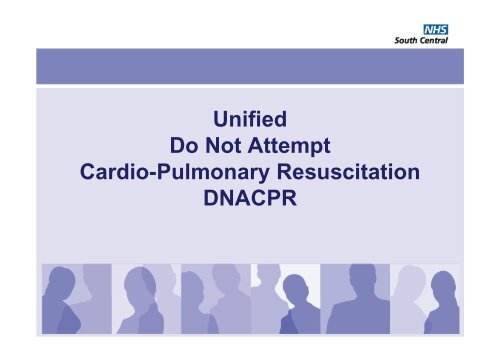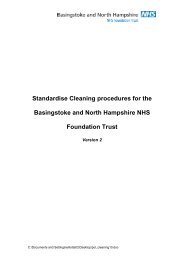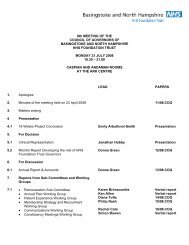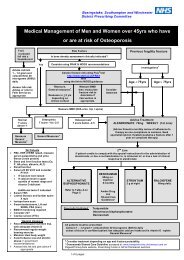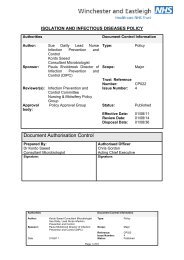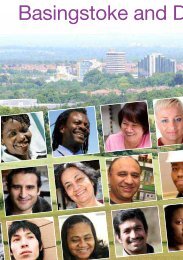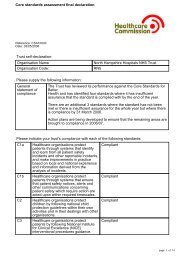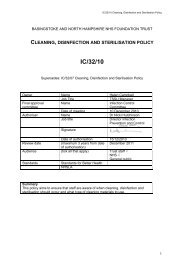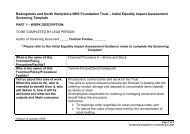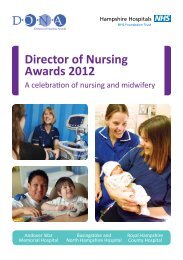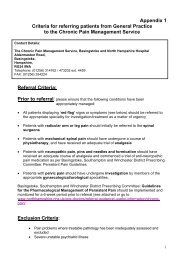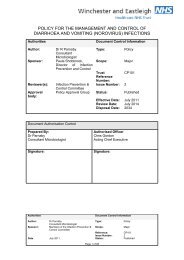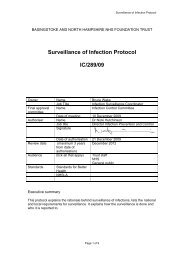Unified Do Not Attempt Cardio-Pulmonary Resuscitation DNACPR
Unified Do Not Attempt Cardio-Pulmonary Resuscitation DNACPR
Unified Do Not Attempt Cardio-Pulmonary Resuscitation DNACPR
Create successful ePaper yourself
Turn your PDF publications into a flip-book with our unique Google optimized e-Paper software.
<strong>Unified</strong><br />
<strong>Do</strong> <strong>Not</strong> <strong>Attempt</strong><br />
<strong>Cardio</strong>-<strong>Pulmonary</strong> <strong>Resuscitation</strong><br />
<strong>DNACPR</strong>
Current Policy<br />
• 2007 DNAR Policy<br />
• Audit March 2010 Level Of<br />
Compliance assessed<br />
• 38 adult decisions reviewed
Current Policy – Criteria Audited<br />
Audit 38 DNAR Decisions March 2010 BNHFT<br />
Yes<br />
No<br />
Recorded in Medical <strong>Not</strong>es<br />
Medical notes - Reasons for decision<br />
Medical notes - Signature & rank of doctor<br />
Medical notes - Date<br />
Medical notes - Time<br />
Recorded in Nursing <strong>Not</strong>es<br />
DNAR Form present at front of notes<br />
Consultant countersigned (within 24hrs)<br />
0% 10% 20% 30% 40% 50% 60% 70% 80% 90% 100%
South Central <strong>Unified</strong> Policy<br />
The new policy will come into effect in May 2010. The Trust policy reflects the<br />
South Central SHA policy, but the formatting has had to be adapted to the<br />
requirements for our in-house policies.
Objective<br />
To ensure all staff are aware and<br />
understand the context, process and<br />
communication of the unified<br />
<strong>DNACPR</strong> policy
• Purpose<br />
Context<br />
- respect the wishes of the individual<br />
- reflect the best interests of the individual<br />
- benefits CPR are not outweighed by burden<br />
- refers to only CPR<br />
- all are presumed to be “For CPR” unless a valid<br />
<strong>DNACPR</strong> decision has been made &<br />
documented or an Advance Decision to Refuse<br />
Treatment (ADRT) prohibits CPR.
Context<br />
• When to make a decision?<br />
- When CPR would not restart the heart &<br />
breathing of the individual, it will not be<br />
attempted<br />
- When CPR might restart the heart and<br />
breathing of the individual, discussion will<br />
occur with the person who has capacity,<br />
(or with other appropriate individuals for people<br />
withoutcapacity) although people have a right<br />
to refuse to have these discussions.
Capacity<br />
Context<br />
Individuals that lack capacity will not be able to:<br />
• understand the information relevant to the decision<br />
• retain that information<br />
• use or weigh that information as part of the<br />
process of making the decision<br />
• to communicate the decision, whether by talking or<br />
sign language or by any other means
Context<br />
Lasting Power of Attorney (LPA) / Personal<br />
Welfare Attorney (PWA). The Mental Capacity Act<br />
(2005) allows people > 18, who have capacity, to<br />
make a LPA by appointing a PWA who can make<br />
decisions regarding health & well being on their<br />
behalf, once capacity is lost<br />
A Court-appointed deputy is appointed by the<br />
Court of Protection (Specialist Court for issues<br />
relating to people who lack capacity to make specific<br />
decisions) to make decisions in the best interests of<br />
those who lack capacity
Context<br />
Independent Mental Capacity Advocate (IMCA)<br />
An IMCA supports and represents a person who<br />
lacks capacity to make a specific decision at a<br />
specific time and who has no family or friends who<br />
are appropriate to represent them<br />
Advance Decision to Refuse Treatment (ADRT) a<br />
decision by an individual to refuse a particular<br />
treatment in certain circumstances. A valid ADRT is<br />
legally binding on healthcare staff
Decision Making Framework<br />
<strong>DNACPR</strong> Decisions<br />
BMA/RCN/RC (UK) guidelines consider it<br />
appropriate for a <strong>DNACPR</strong> decision to be made in<br />
the following circumstances:<br />
• where the individual’s condition indicates<br />
effective CPR is unlikely to be successful<br />
• when CPR is likely to be followed by a length &<br />
quality of life not acceptable to the individual<br />
• where CPR is not in accord with the recorded,<br />
sustained wishes of the individual who is deemed<br />
mentally competent or who has a valid applicable<br />
ADRT.
Decision-making framework
Decision-making framework<br />
Is cardiac or<br />
respiratory<br />
arrest a clear<br />
possibility in the<br />
circumstances of this<br />
person?<br />
NO<br />
If there is no reason to believe that the<br />
individual is likely to have a cardiac or<br />
respiratory arrest it is not necessary to<br />
initiate discussion with them (or those<br />
close to person who lacks capacity)<br />
about CPR. If, however, the individual<br />
wishes to discuss CPR this should be<br />
respected.<br />
YES
Reason for <strong>DNACPR</strong> decision<br />
YES<br />
Is there a realistic<br />
chance that CPR<br />
could be<br />
successful?<br />
YES<br />
NO<br />
When a <strong>DNACPR</strong> decision is made on<br />
these clear clinical grounds, it is not<br />
appropriate to ask the person’s wishes<br />
about CPR, but careful consideration<br />
should be given as to whether to inform<br />
them of the<br />
<strong>DNACPR</strong> decision.<br />
Where the individual lacks capacity and<br />
has a welfare attorney or court-appointed<br />
deputy or guardian, this person should be<br />
informed of the <strong>DNACPR</strong> decision and the<br />
reasons for it as part of the ongoing<br />
discussion about the individual’s care.<br />
If a second opinion is requested, this<br />
should be respected, whenever possible.
Decision-making framework<br />
YES<br />
<strong>Do</strong>es the person<br />
lack capacity?<br />
NO<br />
YES<br />
<strong>Do</strong> they have a valid and applicable<br />
ADRT, if so this must be respected. If an<br />
attorney, deputy or guardian has been<br />
appointed they should be consulted. If<br />
no, a decision will be made on the basis<br />
of best interests. Decision makers have a<br />
legal duty to consult with those close to<br />
the individual who lacks capacity.<br />
If there is no one appropriate to consult<br />
and the person has been assessed as<br />
lacking capacity then an instruction to an<br />
IMCA should be considered
Decision-making framework<br />
Are the potential<br />
risks and burdens of<br />
CPR considered to<br />
be greater than the<br />
likely benefit of<br />
CPR?<br />
NO<br />
YES<br />
CPR should be attempted unless the<br />
individual has capacity and states that<br />
they would not want CPR attempted.<br />
When there is only a very small<br />
chance of success and there are<br />
questions as to whether the<br />
burdens outweigh the benefits of<br />
attempting CPR, the involvement<br />
of the individual (or if the person<br />
lacks mental capacity those close<br />
to him / her) in making the<br />
decision is crucial. When the<br />
individual has mental capacity<br />
their own view should<br />
guide the decision making.
Who Makes The Decision?<br />
Consultant<br />
available<br />
NO<br />
SpR<br />
available<br />
NO<br />
Junior<br />
<strong>Do</strong>ctor<br />
available<br />
YES<br />
YES<br />
YES<br />
• Consultant should follow the “Decision Making Framework”<br />
in the Trust’s policy.<br />
• <strong>Do</strong>cument discussions with other staff, patients and/or<br />
relatives, record background & reasons for any decision in<br />
patients notes: record date, time, print name, grade & sign.<br />
• SpR should follow the “Decision Making Framework” in the<br />
Trust’s policy.<br />
• <strong>Do</strong>cument discussions with other staff, patient’s and/or<br />
relatives, record background & reasons for any decision in<br />
patients notes: record date, time, print name, grade & sign.<br />
• <strong>Do</strong>ctor should follow the “Decision Making Framework” in<br />
the Trust’s policy.<br />
• Discuss patients resuscitation status with Consultant/SpR<br />
before making any decision & document discussion in<br />
patients notes.<br />
• <strong>Do</strong>cument discussions with other staff, patient’s and/or<br />
relatives, ecord background & reasons for any decision in<br />
patients notes: record date, time, print name, grade & sign.
Who Makes The Decision?<br />
• Only once the decision is recorded in the patient’s<br />
medical notes, is the <strong>Do</strong>ctor to complete the SHA<br />
Lilac form<br />
• Place at front of notes<br />
• White duplicate copy to<br />
remain in pad for<br />
audit purposes<br />
• To be verified by<br />
consultant within 48 hours
SCSHA <strong>Unified</strong> Form
SCSHA <strong>Unified</strong> Form
SCSHA <strong>Unified</strong> Form
SCSHA <strong>Unified</strong> Form<br />
This decision will be regarded as<br />
‘indefinite’ unless:<br />
• a definite review date is<br />
specified<br />
• there are changes in the<br />
person’s condition<br />
• their expressed wishes<br />
change<br />
The frequency of review should<br />
be determined by the health<br />
professional in charge of the<br />
individual’s care at the time of<br />
the initial decision
SCSHA <strong>Unified</strong> Form
SCSHA <strong>Unified</strong> Form
Message In A Bottle<br />
In the patients' home, the tear off slip at the bottom of the <strong>DNACPR</strong> form<br />
can be placed in the “Message In A Bottle” to advise that the form is in<br />
the home
Communication of decision<br />
• Decision and presence of form to be recorded in<br />
the nursing notes<br />
• Consider, where appropriate, asking newly<br />
admitted patients (or their relatives/carers) if<br />
they have a lilac <strong>DNACPR</strong> form: decision stands<br />
and a consultant must verify this decision within<br />
48 hours of admission<br />
• Lilac form belongs to the patient: DO NOT<br />
COPY THE FORM
Communication of decision<br />
• Ward clerk to enter the DNAR code in the SR<br />
Code column of PatientCentre
• Review<br />
Communication of decision<br />
This decision is regarded as ‘Indefinite’ unless<br />
i. a definite review date is specified<br />
ii. there are changes in the person’s condition<br />
iii. the person expresses wishes to change the decision<br />
It is preferred that when possible no review date is written as this increases<br />
the risk of the <strong>DNACPR</strong> decision expiring and an inappropriate<br />
resuscitation attempt taking place because the decision was not updated.<br />
If a review date is specified, it is the responsibility of all healthcare<br />
professionals involved in the patient’s care to ensure it is reviewed on time<br />
and consider whether the person can now contribute to the decision making<br />
process if they were unable to when the initial decision was made.
Communication of decision<br />
• Cancellation<br />
In rare circumstances a decision may be made to cancel or revoke the<br />
<strong>DNACPR</strong> decision.<br />
If the decision is cancelled the form should be crossed through with 2<br />
diagonal lines in black ball-point ink and the word ‘CANCELLED’<br />
written clearly between them, dated and signed by the healthcare<br />
professional and documented in the notes.
Communication of decision<br />
• Suspension<br />
In some circumstances there are reversible causes of a cardio respiratory<br />
arrest. These are either pre-planned or acute and the individual should<br />
receive treatment, unless intervention in these circumstances has been<br />
specified.<br />
• Pre planned - induction of anaesthesia, cardiac catheterisation,<br />
pacemaker insertion or surgical operations etc;<br />
• Acute - Where the person suffers an acute, unforeseen, but<br />
immediately life threatening situation such as anaphylaxis or<br />
choking. In such circumstances CPR would be appropriate while the<br />
reversible cause is treated.
Communication of decision<br />
• If the patient is discharged, the form must go<br />
with the patient: presence of a <strong>DNACPR</strong><br />
decision should be communicated in the<br />
discharge summary: do not copy the form and<br />
place in notes<br />
• If discharged prior to consultant verification, GP<br />
to be contacted re verification of decision<br />
• If Lilac form found in notes post discharge, liaise<br />
with the patient / GP to ensure the patient<br />
receives the form
Paediatric<br />
• Advance Care Plan – Children & Young<br />
Persons to be introduced in 2010 also
Any Questions?
Summary<br />
Understanding, the context, process<br />
and communication of the<br />
<strong>DNACPR</strong> policy will reduce<br />
inappropriate resuscitation attempts
Further information / advice<br />
• Local contacts<br />
Name: Dr Lara Alloway,<br />
Consultant in Palliative Medicine,<br />
Associate Medical Director (End of Life)<br />
Tel: 01256 314729<br />
Email: lara.alloway@bnhft.nhs.uk<br />
Name: Chris Homans,<br />
<strong>Resuscitation</strong> Officer<br />
Tel: 01256 313317<br />
Email: chris.homans@bnhft.nhs.uk<br />
• SCSHA <strong>DNACPR</strong> Project lead<br />
Tel: 01635 275500
References<br />
• Advance Decision to Refuse Treatment, a guide for health and social care<br />
professionals. London: Department of health<br />
http://www.ncpc.org.uk/download/publications/ADRT.pdf [Accessed 03-06-2009]<br />
• Coroners Act 1988 London: Crown Copyright. Coroners Act 1988 (c. 13) [Accessed<br />
12/10/2009]<br />
• Human Rights Act. (1998) London: Crown Copyright.<br />
http://www.opsi.gov.uk/acts/acts1998/ukpga_19980042_en_1 [Accessed 03-06-<br />
2009]<br />
• Mental Capacity Act. (2005) London: Crown Copyright.<br />
http://www.opsi.gov.uk/acts/acts2005/ukpga_20050009_en_1 [Accessed 03-06-2009]<br />
• NHS End of Life Care Programme & the National Council for Palliative Care (2008)<br />
• <strong>Resuscitation</strong> Council UK (2007) Decisions relating to cardiopulmonary resuscitation;<br />
a joint statement from the British Medical Association, the <strong>Resuscitation</strong> Council (UK)<br />
and the Royal College of Nursing. RC (UK) http://www.resus.org.uk/pages/dnar.pdf<br />
[Accessed 03-06-2009]<br />
• <strong>Resuscitation</strong> Council UK (2009) Recommended standards for recording <strong>Do</strong> not<br />
attempt resuscitation (DNAR) decisions. RC (UK)<br />
http://www.resus.org.uk/pages/DNARrstd.htm [Accessed 21-12-09]<br />
• Royal College of Physicians (2009) Advance Care Planning. London: Royal College<br />
of Physicians http://www.rcplondon.ac.uk/pubs/contents/9c95f6ea-c57e-4db8-bd98-<br />
fc12ba31c8fe.pdf [Accessed 03-06-2009]<br />
• Healthcare Commission (2007) Spotlight on Complaints. London: HC.


